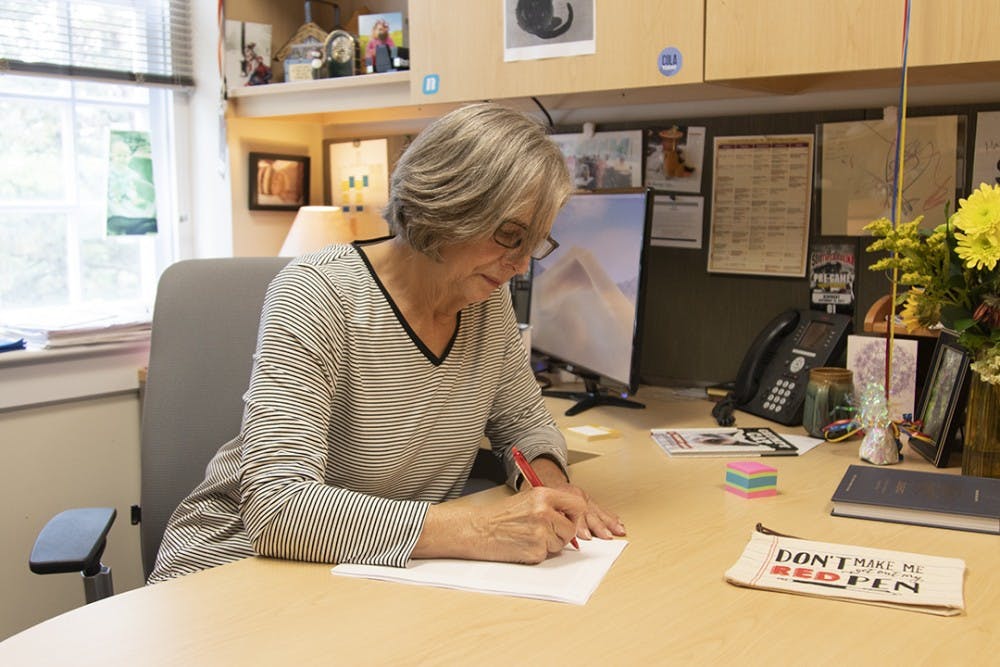When communications professor Lisa Sisk first received her diagnosis last fall for primary progressive aphasia, a rare neurological disease which affects someone’s ability to use language to communicate, she said she cried for nearly three days.
“I make my living with words, and I couldn’t do that anymore,” Sisk said.
For Sisk, who has been teaching in the School of Journalism and Mass Communications for 19 years, the diagnosis was devastating and seemed career-ending.
“It was really sad to realize that my classroom teaching days are over,” Sisk said. “But then I realized that there was nothing I could do about it, and I wanted to power through.”
Now, donning a metal bracelet she bought herself with the mantra “nevertheless, she persisted” inscribed on it, Sisk continues her involvement in the School of Journalism and Mass Communications daily by instructing online courses.
According to the National Institute of Health, primary progressive aphasia is caused by a loss of tissue in the area of the brain responsible for producing language. Symptoms of the disease include behavioral changes and a gradual loss of language abilities.
Even before developing symptoms and receiving her diagnosis in the fall of 2018, Sisk helped establish online courses in the journalism school after developing the nonprofit communications online course in 2017 and the crisis communications online course in 2018.
Since leaving the classroom at the end of last semester, Sisk said she has devoted herself to teaching courses online in an organized, personal and quality way. The Center for Teaching Excellence asked her to be a quality reviewer for other online courses.
“I went into it kicking and screaming, and I just thought I wouldn’t like it, but I’m a pro,” Sisk said.
Augie Grant, journalism professor and close colleague since 2004, said Sisk has bounced back from her diagnosis through her online courses.
“What she’s done is she’s taken the heart of her teaching and said, ‘I'm gonna keep doing this, but I'm gonna do this in the way that works now,’” Grant said. “She still prepares the material, she still gets to know her students, she’s still teaching the courses she has. The only difference is instead of being face to face, it’s online.”
Grant said Sisk's example impacts faculty members and demonstrates that teaching is, above all, about the students.
“I wish I had the grace that she has shown,” Grant said. “We all go through so much, and we can tend to be self-absorbed, and when we can see an example: ‘OK, it’s not about you, it’s about the teaching; it’s about the students.’ That gives us something to hang onto.”
Grant said in the eyes of many faculty and students, what makes Sisk remarkable is the personal relationships she develops with everyone she meets.
“She walks into a room, it’s not that she has 30 students — she’s got 30 individuals." Grant said. "She finds a way to connect with each one."
Tim Frisby, a former student of Sisk who graduated in 2007 and now works as a program coordinator at the Columbia office of the attorney general, spoke about the personal relationship he has had with Sisk, both as a student and afterward.
“Everybody obviously thinks that they’re her favorite,” Frisby said. “She really is a kind of person that’s always in their corner.”
That sense of support that many felt from her in past years was certainly reciprocated when she announced her diagnosis last fall.
“When I made the announcement to my colleagues, the outpouring was phenomenal,” Sisk said. “The first thing I posted on Facebook was the university article, and that got 568 responses, 390 comments and 30 shares. My public relations campaign students threw me a party on my last day.”
Frisby said he believes this is a time in which everyone Sisk knows will come to rally around her, as a chance to show the support which she always showed to them.
“She was always there for us, now we’re there for her,” Frisby said.

